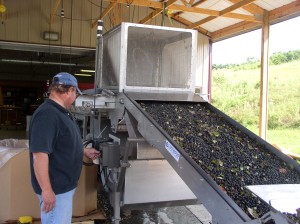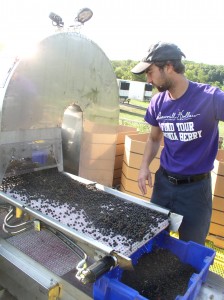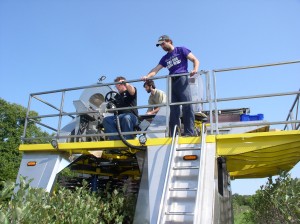By Elizabeth Lauren Moore, for FSA Public Affairs
In the spring of 2012, Iowa farmers experienced a harsh freeze that damaged crops and altered production for the year. Vaughn Pittz, his wife Cindy and son Andrew were among the many producers that suffered significant losses, adversely affecting their Sawmill Hollow Family Farm, an organic aronia berry farming operation in Harrison County.
Aronia berries, also known as chokeberries, are native to the Northeastern United States and serve mostly as an ornamental plant, but the berries also are said to be resistant to drought, insects, pollutants and disease, which make the berry a versatile and valued food source. They are used to make wines and teas in Europe, and with their semi-sweet taste, are used in the United States in blended juice drinks.
The Pittz family operates a sixth-generation family farm that dates back to 1882. They converted Sawmill Hollow during the mid-1990s to what is considered the first aronia berry operation in the United States. And it’s organic.
According to Andrew, his family wanted to find a “healthy, native fruit with the potential to create a new agriculture industry for Iowa. In general, crop failures due to climatic conditions can devastate families, farming communities, and in the case of the aronia berry, an industry in its infancy,” Andrew said. “Important programs from the USDA invest in farm families and help keep America farming.”
For more than 15 years, the Farm Service Agency’s (FSA) Noninsured Crop Disaster Assistance Program (NAP) has provided financial assistance to producers that have suffered a loss of crops due to natural disasters.
Andrew said that even though the Pittz family was aware of FSA programs, there weren’t safety-net opportunities for the aronia berry prior to the 2014 Farm Bill, when berries were added as eligible crops for NAP. Further, new NAP benefits made coverage retroactive to 2012, authorizing payments for frost/freeze losses.
“The Farm Service Agency’s investment counteracting the massive loss of berries in 2012 was very helpful for Sawmill Hollow and Iowa growers,” said Andrew. “It’s a great example of how smart government and farmers can work together to foster rural vitality.”
Not only is Sawmill Hollow a successful organic farming operation, but the Pittz family is securing a future for the aronia berry in the United States. Over the last ten years, Sawmill Hollow has held workshops–teaching farmers how to plant, grow, maintain and harvest the crop. Sawmill Hollow currently processes aronia berries for more than 100 growers.
“Iowa is agriculture,” said Andrew. “From leading the world in traditional crops; corn and soybeans, to complementary crops such as aronia berries, grapes, apples, and wind energy–Iowa is growing.”
To add to their entrepreneurial experience with the aronia berry, the Pittz family found an American-made combine so the berries didn’t have to be harvested by hand, the traditional method. They contacted a company in Oregon that makes combines for blueberries. With input from Vaughn and Andrew Pittz, the company made a machine specifically for Midwestern aronia.
“We are growing a new American industry, from the plants, to the harvesting, to manufacturing processes. Having an American machine represents one more potential element of rural vitality through this new value added crop,” Andrew said.
It is because of the increasing number of farmers in the aronia berry industry and the growing demand that made NAP disaster assistance a necessity.
“For family farmers and rural communities, the FSA is a great partner for continued agricultural growth. It is helping sustain rural America,” Andrew said. “Thanks to Secretary Vilsack’s visionary leadership, farms and rural businesses have more opportunities to succeed than ever before.”
To learn more about the Non-insured Crop Disaster Assistance Program, visit www.fsa.usda.gov/nap.








